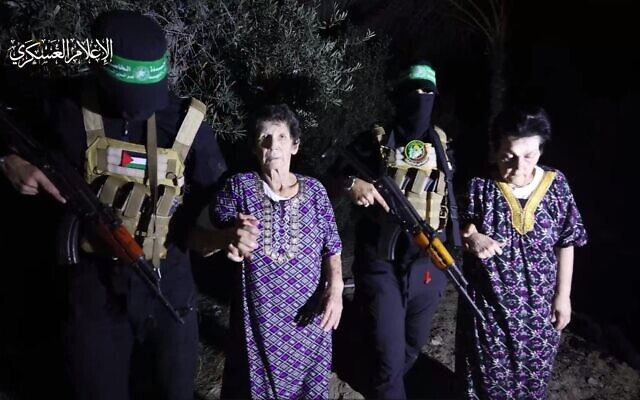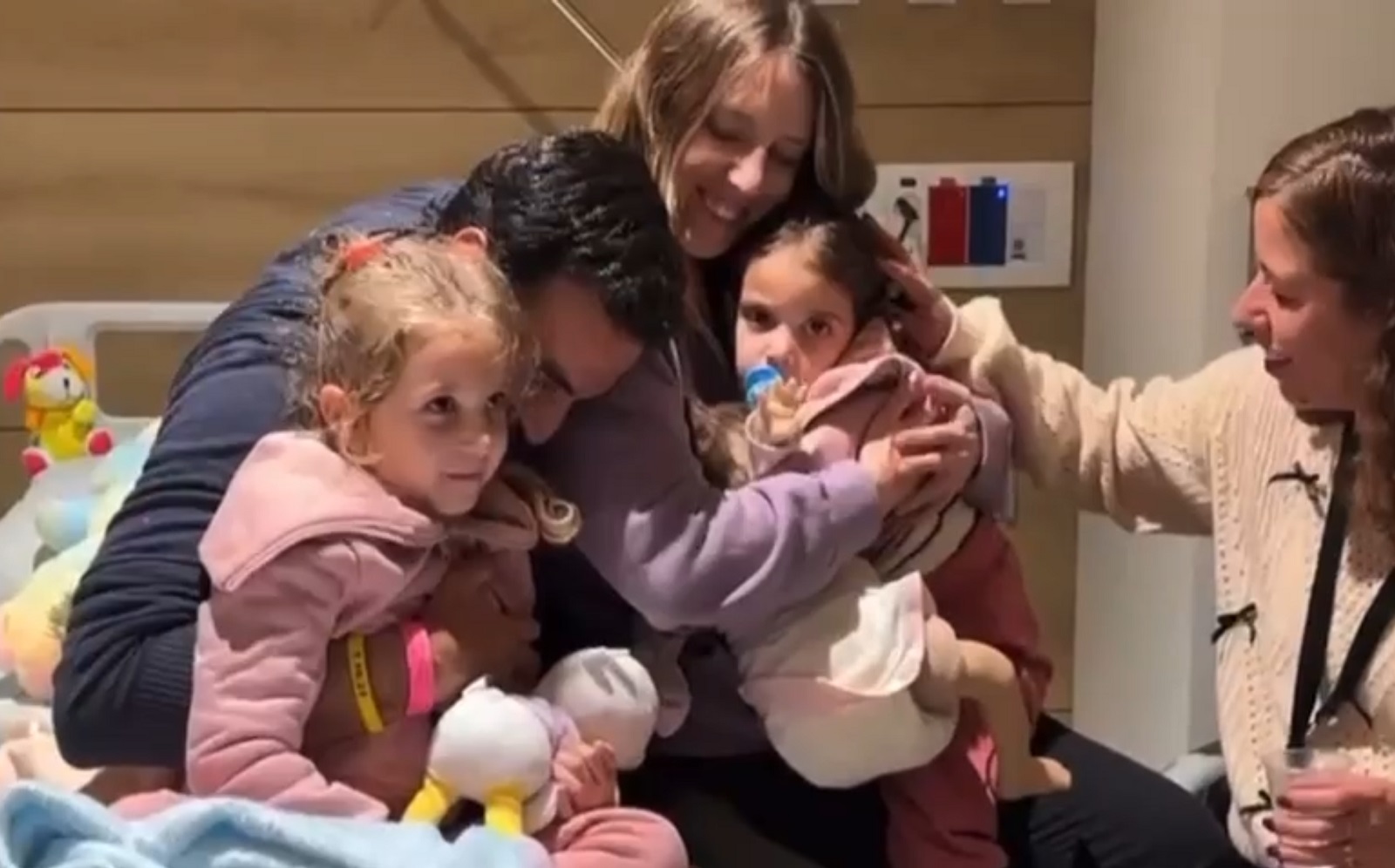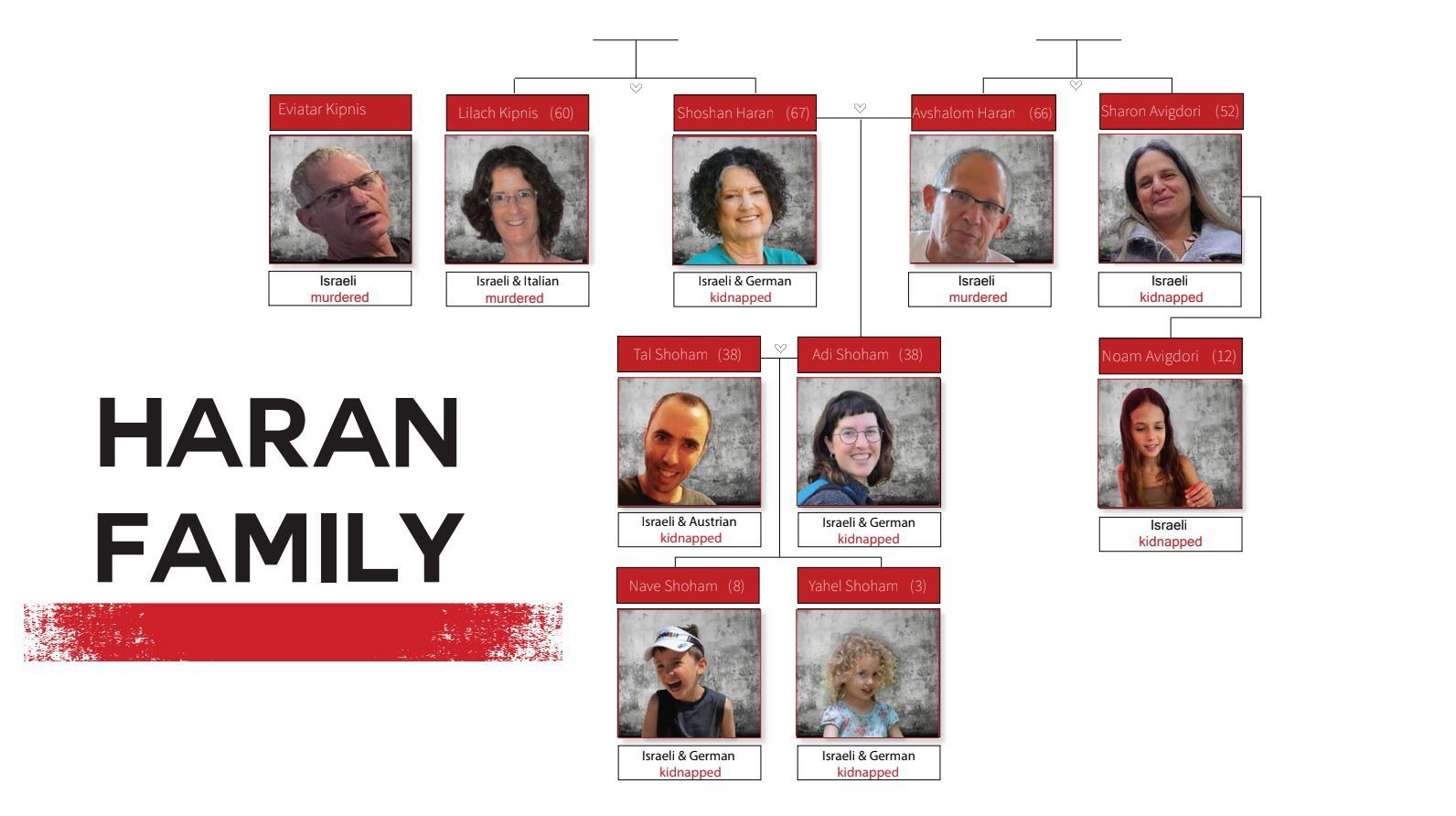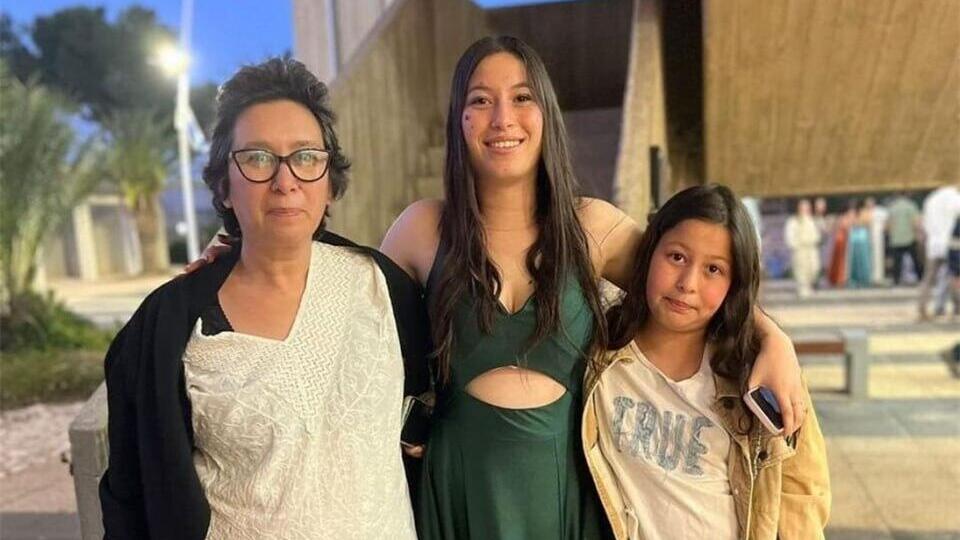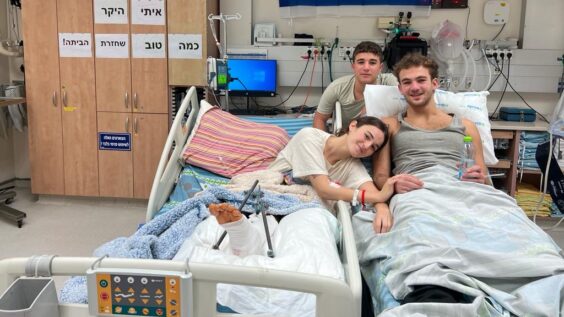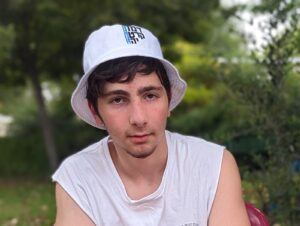The week-long lull in fighting between Israel and the Hamas terrorist group ended this morning, and with the resumption of the conflict in the Gaza Strip, hopes for further hostage releases have receded, at least for now.
During the cease-fire, which went into effect last Friday for an initial four days and was then extended by three, Israelis were taken on a rollercoaster of emotions as they waited each day to learn who was on the daily list to be released, whether their loved ones were among them, whether releases would actually go ahead, and, finally, how the released hostages looked when they finally emerged from almost two months of brutal captivity. Underlying the joyous tears of family reunions every day was devastating grief for murdered family members and crushing anxiety for other loved ones still held hostage.
All together, during the cease-fire, 105 hostages were released from Hamas captivity, among them 81 Israeli women and children, one Russian-Israeli man (released in a special concession to Russian President Vladimir Putin), and 24 foreign nationals (23 Thais and one Filipino).
In the weeks before the cease-fire, four Israeli women were released and one was rescued by Israeli forces, making for a total of 86 freed Israeli hostages to date.
In addition, the bodies of two female hostages were recovered from Gaza several weeks ago, and this week the deaths of two men who had been presumed to be captives were confirmed.
It is believed that about 130 people taken hostage during the murderous Hamas attacks in Israel on Oct. 7 are still in captivity in the Gaza Strip.
Questions are swirling over the fate of the Bibas family of Kibbutz Nir Oz, who have become one of the most prominent symbols of Hamas’ lack of humanity. Father Yarden was seen in a video being taken away by terrorists with blood streaming from his head, while a video of mother Shiri, clearly terrified and clutching her two red-headed children, infant Kfir and toddler Ariel, as they were surrounded by terrorists, has been seen around the world. Baby Kfir, then only nine months old, was the youngest hostage taken by Hamas, and Ariel would have spent his 4th birthday in captivity.
Hamas this week claimed that Shiri and her two little boys had been killed in Gaza in an Israeli airstrike. The IDF said it was investigating the claim.
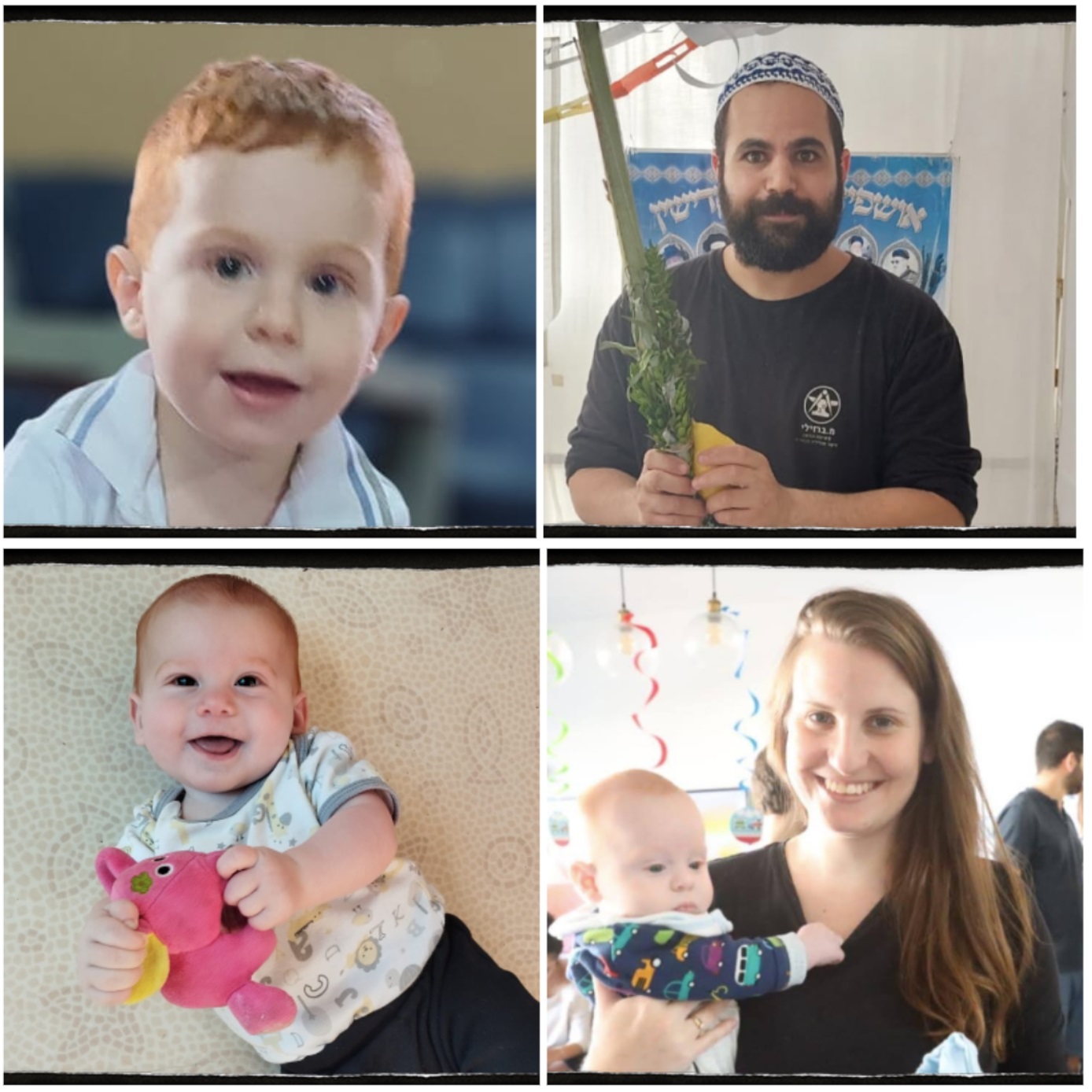 [1]
[1]Among the most recognizable hostages being held in Gaza are the Bibas family: father Yarden, mother Shiri, and children Ariel, 4, and Kfir, 10 months. (Courtesy)
In return for the hostage releases, Israel released over 230 Palestinian security prisoners, all women or minors convicted or accused of various offenses, with three prisoners released for every Israeli hostage under the terms of the agreement. Israel also facilitated the daily transfer of hundreds of trucks of humanitarian aid and fuel into the Gaza Strip and stopped all military operations in the enclave.
The cease-fire came into effect at 7 am on Friday, Nov. 24, with an agreement that 50 Israeli women and children would be released in exchange for 150 Palestinian prisoners. Those 50 were released in four groups over that evening and over the next three evenings. The Russian-Israeli man and the foreign nationals were released with them, but in separate deals.
Reports from Israeli, American, Qatari, Egyptian, and Hamas officials then confirmed an agreement to extend the cease-fire by two days, with 10 Israeli women and children to be released for each day of the extension.
Early Thursday morning, after a nerve-wracking night in which Hamas submitted a list of hostages to be released that was acceptable to Israel just 20 minutes before the 7 am deadline, it was agreed to extend the cease-fire for another day.
Quite apart from the general issue of taking civilians hostage, many of them elderly people or young children, Hamas has been heavily criticized for dividing families during captivity and during the releases, holding some family members back while letting others go. Several cases in which they separated children from parents violated the terms of the cease-fire agreement.
Prof. Hagai Levin, head of the medical team with the Hostages and Missing Families Forum, spoke with The Media Line about the issue of separating families from a medical and humanitarian perspective.
“It’s insane to separate a young woman from her brother, or a child from her mother who is in [Hamas] captivity as well …,” he said. “It’s immoral, and it means that there’s still an open wound in all our hearts. … Imagine how hard it is to start the healing process when [family] is still in captivity.”
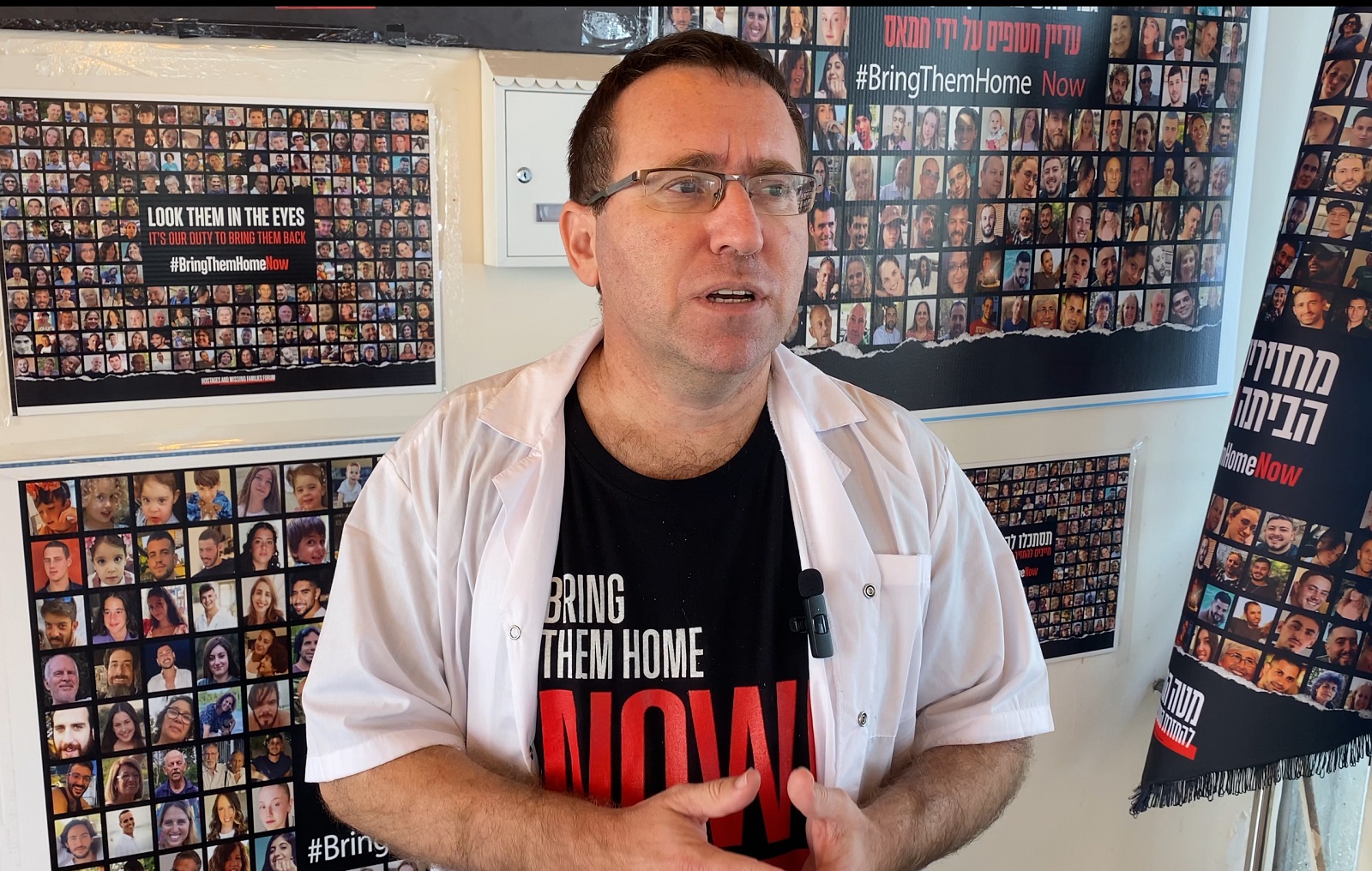 [2]
[2]Prof. Hagai Levin, head of the medical team at the Hostages and Missing Families Forum, speaks with The Media Line from the Families Forum headquarters in Tel Aviv, Israel, Nov. 26, 2023. (Aaron Poris/The Media Line)
The families of the released captives have vowed to continue their fight until all the hostages are released, and are also seeking the return of four captives or their remains who were taken to Gaza in 2014-2015, long before the current conflict: fallen IDF soldiers Oron Shaul and Hadar Goldin, and civilians Avera Mengistu and Hisham Al-Sayed.
“We cannot build this country again without each and every one of the hostages,” Adva Adar, granddaughter of released hostage Yafa Adar, told The Media Line.
At a minimum, the Hostages and Missing Families Forum is calling on Hamas to allow the Red Cross to visit the hostages and provide aid.
The release of the hostages is one of the two primary goals Israel has set in the war with Hamas. The second goal is the complete destruction of the terror group’s political and military infrastructure, and its removal from power in Gaza.
BEFORE THE CEASE-FIRE
The first hostages were released on Oct. 20, when Hamas freed two Israeli-American women, Judith Raanan and her teenage daughter Natalie, who had been taken from Kibbutz Nahal Oz during the Oct. 7 massacre.
The release was publicly attributed to “humanitarian reasons,” as well as Qatari and US pressures. However, it was widely received as a PR stunt to improve Hamas’ image on the international stage after the terror group’s atrocities cost them support.
Two members of Judith and Natalie’s extended family were killed in the Oct. 7 attacks, and eight other members of their wider family still remain in captivity.
On Oct. 23, Hamas released two more Israeli women, Nurit Cooper, 79, and Yocheved Lifshitz, 85, again for alleged “humanitarian reasons” under international mediation.
However, Lifshitz’s husband, Oded, 83, and Cooper’s husband, Amiram, 84, are still in captivity in Gaza. It is suspected that Hamas kept the two men as well as other released hostages’ family members as leverage to ensure they speak favorably of their time in captivity when in public.
Israeli forces also rescued one hostage, female soldier Ori Megidish. No details have been released about the rescue operation.
CEASE-FIRE DAY 1: FRIDAY, NOV. 24
In the first release under the cease-fire, 13 Israeli women and children were freed, along with 10 Thais and one Filipino released under a separate deal. Almost all the Israelis are from Kibbutz Nir Oz, one of the hardest hit in the Oct. 7 attacks, most have family members who were murdered, and most still have family members being held hostage.
The released Israelis are:
Adina Moshe, 72, whose husband, Sa’id, was murdered on Oct. 7.
Danielle Aloni, 45, and her daughter, Emilia, 5. Danielle infamously featured in one of Hamas’ hostage videos.
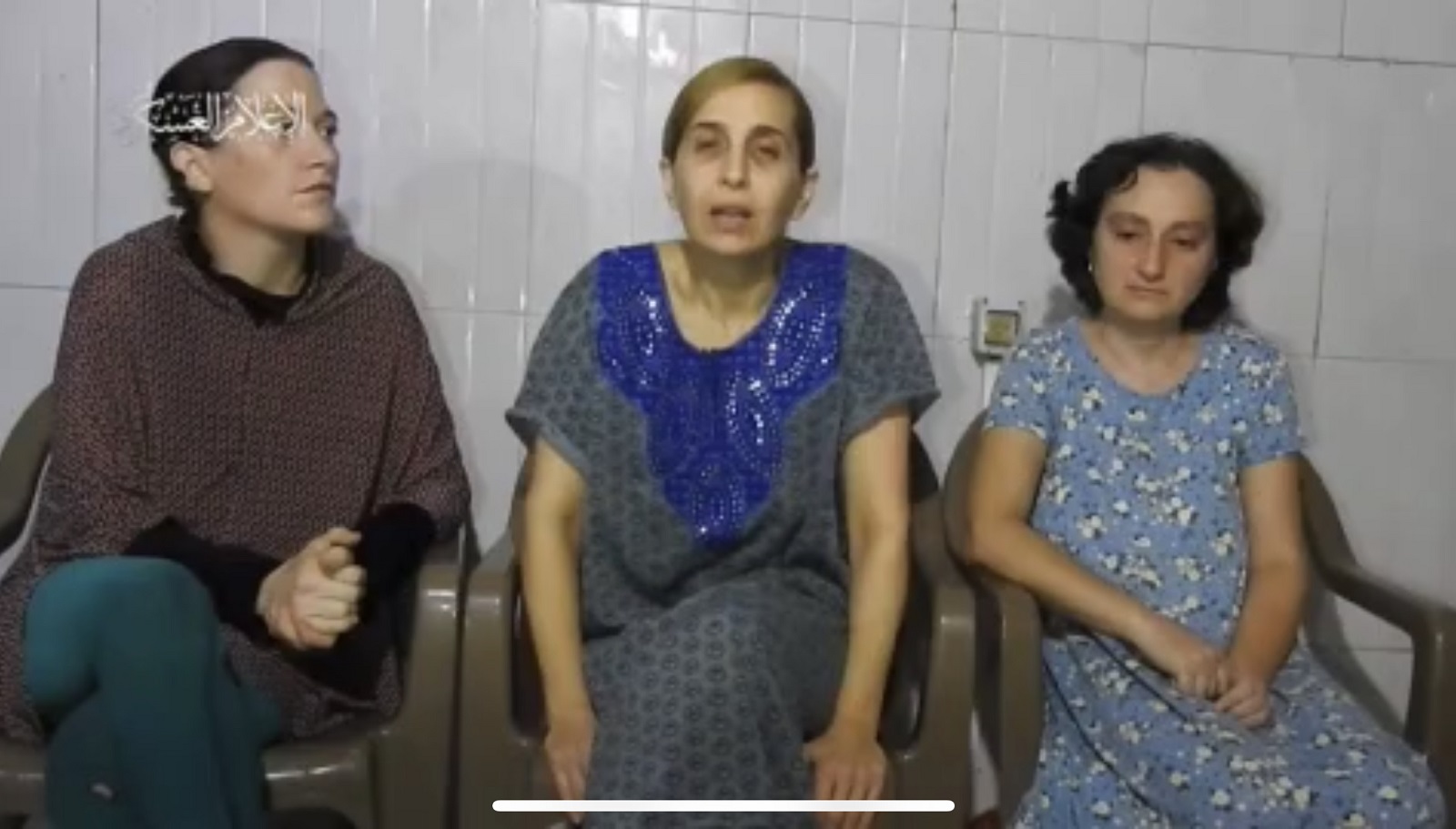 [4]
[4]From left: Rimon Kirsht, Danielle Aloni, and Lena Trupanov in a Hamas hostage video released Oct. 30. (Screenshot)
Hanna Katzir, 77, who featured in a hostage video before Hamas reported that she had died in captivity. Her husband, Rami, was murdered on Oct. 7.
Ruth Munder, 78, her daughter, Keren Munder, 54, and her grandson, Ohad, 9. Ruth’s husband, Avraham, is still in captivity, and her son, Roee, was murdered on Oct. 7.
According to Keren Munder’s cousin, Merav Mor Ravvi, Keren, Ruth, and Ohad were kidnapped and kept separately from Avraham. They assumed he had been murdered and only learned that he was still alive and in captivity when they were released. Ravvi said that each family member lost 6-7 kilograms (13-15 pounds), while in captivity, where they were fed mostly rice and bread.
Channa Peri, 79, a mother of three. One of her children was murdered by Hamas on Oct. 7 and another remains a Hamas hostage in Gaza.
Yafa Adar, 85, who was infamously seen being driven away in a golf cart by her Hamas captors on Oct. 7. Her grandson, Tamir Adar, 38, is still a hostage.
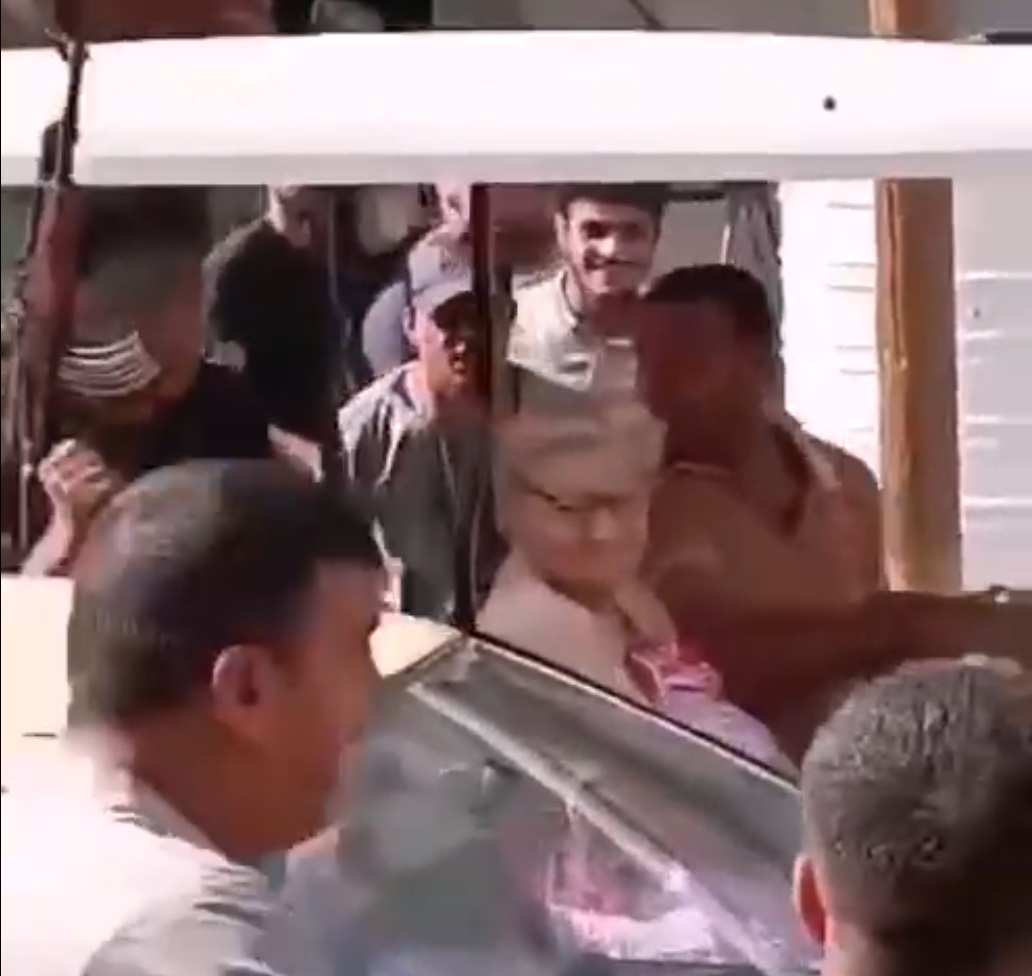 [5]
[5]Hostage Yafa Adar, 85, is seen being ferried into Gaza on a kibbutz golf cart by Hamas, Oct. 7, 2023. (Screenshot)
Doron Katz-Asher, 34, and her two daughters, Raz, 4, and Aviv, 2, were taken hostage while visiting family in Nir Oz on Oct. 7. Doron’s mother, Efrat, was murdered in the attacks and Efrat’s partner, Gadi Mozes, and several other family members remain in captivity.
Margalit Mozes, 78, who suffers from serious health risks as a cancer survivor with diabetes and fibromyalgia.
DAY 2: SATURDAY, NOV. 25
Give the gift of hope
We practice what we preach:
accurate, fearless journalism. But we can't do it alone.
- On the ground in Gaza, Syria, Israel, Egypt, Pakistan, and more
- Our program trained more than 100 journalists
- Calling out fake news and reporting real facts
- On the ground in Gaza, Syria, Israel, Egypt, Pakistan, and more
- Our program trained more than 100 journalists
- Calling out fake news and reporting real facts
Join us.
Support The Media Line. Save democracy.
The second group released under the cease-fire comprised 17 hostages: 13 Israeli women and children and four Thai nationals. The release came after a seven-hour delay in which Hamas claimed Israel had violated the terms of the agreement, including failing to deliver aid and to halt Israeli Air Force flights overhead. Hamas provided no evidence for its claims, and Israel published footage of aid trucks arriving at the Rafah crossing into the Gaza Strip.
In response to Hamas’ delays, Israel threatened to resume its attack if the hostages were not released by the midnight deadline. The release came minutes before the deadline. The released hostages were mostly from Kibbutz Be’eri, another of the kibbutzes hardest hit in the Oct. 7 attacks. Three children from two families were returned without their parents, in violation of the cease-fire agreement.
The released Israelis are:
Hila Rotem Shoshani, 12, from Kibbutz Be’eri, whose mother, Raaya, remains a hostage in Gaza. Hila told the Israeli authorities she had been in captivity with her mother until two days before the release.
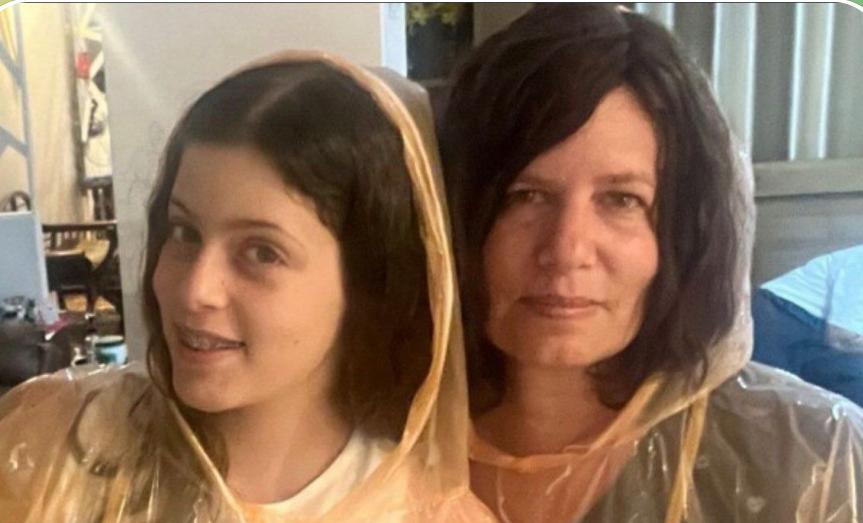 [8]
[8]Hila Rotem Shoshani and her mother Raaya. Hila was released from Hamas captivity. Raaya was not. (Courtesy)
Noam Or, 17, and his sister, Alma Or, 13, whose mother, Yonat, was murdered by Hamas on Oct. 7. Their father, Dror, remains a hostage.
Maya Regev, 21, who was taken captive at the Nova music festival with her brother, Itai, 18. Itai remains in captivity. Maya was shot and injured at the music festival and her last, nightmarish phone call to her father was later publicly released.
Maya Regev speaks with her father on the phone as she and her brother, Itai, run from Hamas at the Nova music festival on Oct. 7. The call ends abruptly with screaming and voices speaking in Arabic. (Courtesy)
Shira Weiss, 53, and her daughter, Noga, 18, from Kibbutz Be’eri. Shira’s husband, Ilan, is missing and her brother, Gil Boyum, and nephew, Inbar, were murdered on Oct. 7.
Emily Hand, 9, whose story captivated the world, came home to her father, Thomas, on Saturday night. Her father’s ex-wife, Narkiss Hand, was murdered on Oct. 7.
 [9]
[9]Emily Hand, 9, reunites with her father, Thomas, on Nov. 25, after 50 days in Hamas captivity in Gaza. (GPO)
Shoshan Haran, 67, from Kibbutz Be’eri, who suffered multiple losses on Oct. 7. Her husband, Avshalom, sister Lilach Kipnis, brother-in-law Eviatar, and caregiver Paul were all murdered.
Her daughter, Adi Shoham, 38, and Adi’s two children, Nave, 8, and Yahel, 3. Adi’s husband, Tal, remains a hostage.
Avshalom’s sister, Sharon Avigdori, 52, and Sharon’s daughter, Noam, 12.
The Avigdori family reunites at Sheba Hospital in central Israel after mother Sharon Hertzman Avigdori and daughter Noam, 12, are released, Nov. 25. (GPO)
DAY 3: SUNDAY, NOV. 26
An additional 14 Israeli hostages were released in the third group, on Sunday, Nov. 26. Nine are children, five of them left fatherless in the Oct. 7 massacre, and one orphaned entirely.
The released Israelis are:
Avigail Idan, who turned 4 in Hamas captivity. Avigail saw Hamas murder both of her parents and managed to escape to the home of their neighbors, the Brodutch family, where she was taken captive with them and released with them. Avigail’s siblings, Michael, 9, and Amelia, 6, hid in a closet for 14 hours during the horrors and survived, and were taken in by their aunt and uncle.
Hagar Brodutch, 39, and her three children, Ofry, 10, Yuval, 8, and Oria, 4, who were released with Avigail.
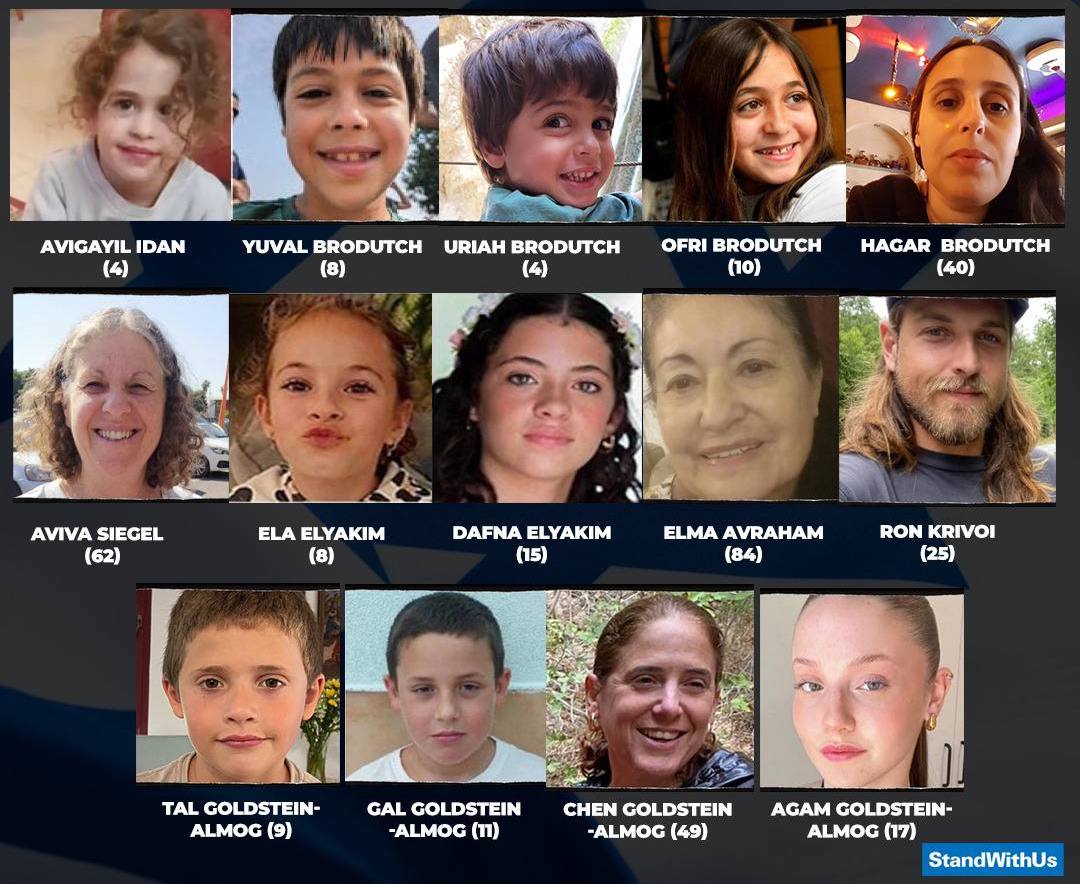 [11]
[11]Fourteen Israeli hostages who returned to Israel, Sunday, Nov. 26 (StandWithUs and the Hostages and Missing Families Forum)
Chen Goldstein, 48, and her three children, Agam, 17, Gal, 11, and Tal, 8. Chen’s husband, Nadav Goldstein-Almog, and their eldest daughter, Yam, 21, were killed on Oct. 7.
Sisters Dafna Elyakim, 15, and Ela Elyakim, 8, saw the murders of their father, Noam, his partner, Dekla, and her son, Tomer, 15, on Oct. 7. Hamas filmed and live-streamed their abuses of the Elyakim family, including how they forced Tomer at gunpoint to go door to door to the neighbors in an effort to coax them to come outside. Noam appears to have already been shot in the video.
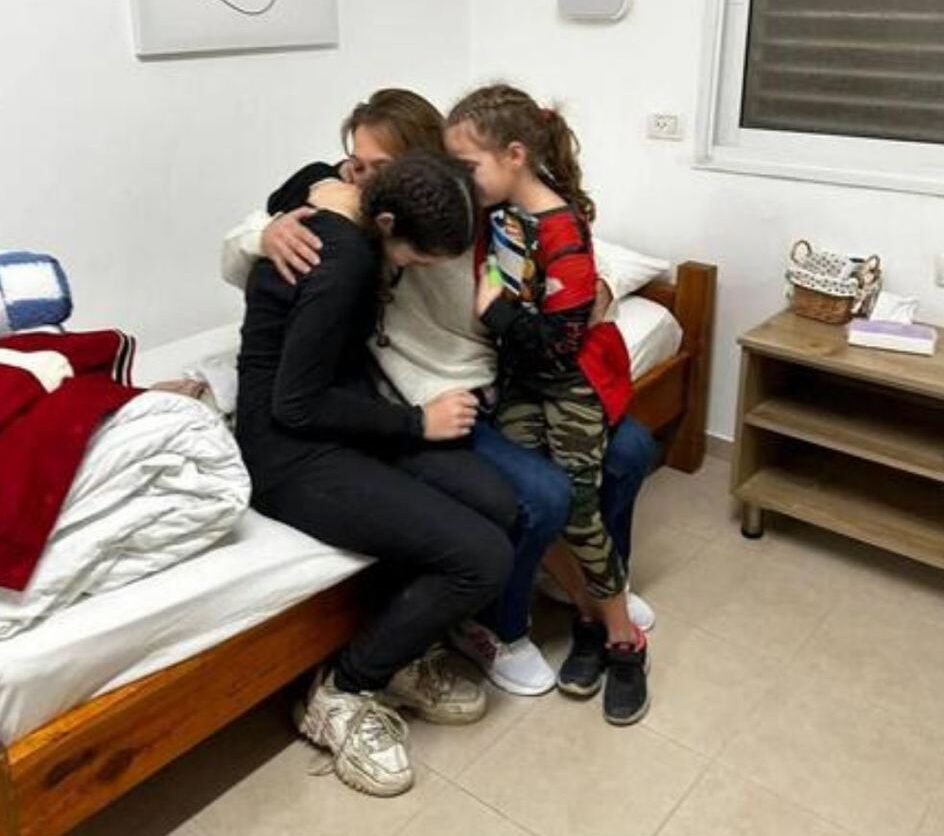 [12]
[12]After 51 days in captivity, Dafna Elyakim, 15, and Ela Elyakim, 8, are reunited with their mother, Nov. 26, 2023. (Courtesy)
Aviva Adrian Siegel, 62, was kidnapped with her husband, Keith, who remains in captivity.
Elma Avraham, 84, among the eldest of the hostages, was released in critical condition, and has since been hospitalized and has stabilized. Elma had earlier had open-heart surgery and required medications and medical care that she did not receive in captivity.
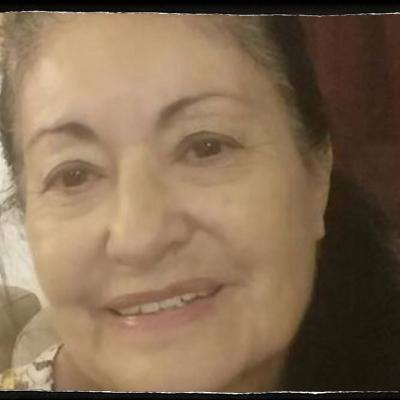 [13]
[13]Elma Avraham, 84, who was returned to Israel on Sunday, Nov. 26 in critical condition and required intensive care in hospital. (Courtesy)
Russian Israeli man Ronnie Krivoi, 25, who was captured while working at the Nova music festival, was also released, in a special concession to Russian President Vladimir Putin.
DAY 4: MONDAY, NOV. 27
The fourth group released contained 11 Israelis—two women and nine children—and six Thai nationals. The Israelis were mostly from Kibbutz Nir Oz.
The released Israelis are:
Karina Engel-Bert, 51, a cancer survivor, and her two daughters, Mika, 18, and Yuval, 11. Karina’s partner, Ronen Engel, 54, is still in captivity.
Sharon Aloni-Cunio, 34, the sister of Danielle Aloni who was released on Friday, and her twin 3-year-old daughters, Emma and Yuly. Sharon’s husband, David, his brother Ariel, Ariel’s girlfriend Arbel Yehoud, and Arbel’s brother Dolev Yehoud are all still hostages.
Sahar Kalderon, 16, and her brother Erez, 13. Their mother, Hadas, has been one of the leading voices in the Hostages and Missing Families Forum since it was first formed. Her ex-husband, Ofer, 53, remains a hostage in Gaza. Hadas’ mother, Carmela Dan, 80, and niece Noya Dan, 13, were initially assumed to have been kidnapped but were later identified as having been murdered on Oct. 7.
 [15]
[15]From left: Sahar Kalderon, Erez Kalderon, and their father, Ofer Kalderon. Sahar and Erez were released from Hamas captivity on Monday, Nov. 27. Ofer is still being held hostage in Gaza. (Courtesy)
Noya, who was on the autism spectrum, was made famous by Harry Potter author JK Rowling, who shared a picture of the girl dressed as book character Hermione Granger.
Kidnapping children is despicable and wholly unjustifiable. For obvious reasons, this picture has hit home with me. May Noya and all hostages taken by Hamas be returned soon, safely, to their families. https://t.co/YIbf3egib4 [16]
— J.K. Rowling (@jk_rowling) October 16, 2023 [17]
Or Yaakov, 16, and his brother Yagil, 12. Yagil featured in a hostage video released by the Islamic Jihad terror group on Nov. 9, looking gaunt and pale. Their father, Yair, and his partner, Meirav Tal, were taken hostage.
Eitan Yahalomi, 12. His mother and two siblings, ages 10 and 2, managed to escape being captured, but his father, Ohad, is still a hostage.
DAY 5: TUESDAY, NOV. 28
With the cease-fire extended by two days in exchange for the release of 10 Israeli hostages each day, a fifth group was released, comprising the agreed 10 Israelis—nine women and one teenage girl—plus two Thai nationals.
The Israelis released mostly came from Kibbutz Nir Oz. They are:
Rimon Kirsht Buchshtav, 36, of Kibbutz Nirim, a volunteer at Maslan, The Negev’s Sexual Assault and Domestic Violence Support Center. Her husband, Yagev, was also abducted on Oct. 7 and remains a Hamas captive.
Gabriela Leimberg, 59, of Jerusalem, a manager at the SHEKEL organization that provides community services for people with disabilities, who also runs a day center for people with autism.
Mia Leimberg, 17, Gabriela’s daughter, a 12th-grade student at a Jerusalem arts high school who works at a bookshop. She was taken captive with the family shih tzu dog, Bella, and was seen being released with the pooch in her arms.
Clara Merman, 63, of Kibbutz Nir Yitzhak, Gabriela Leimberg’s sister, a mother of two and grandmother of three who is a retired kindergarten teacher who continues to work with the elderly and guide at-risk families. She was kidnapped with her partner, Luis, and her brother Fernando, both of whom are still hostages in Gaza.
Ofelia Roitman, 77, of Kibbutz Nir Oz, a mother of three and grandmother of nine who was a teacher for 20 years and a principal at Jewish schools in Argentina for five years.
Ditza Heiman, 84, one of the founders of Kibbutz Nir Oz, a widowed mother of four, grandmother of 20 and great-grandmother of five, who lived alone with her cat.
Tamar Metzger, 78, also of Kibbutz Nir Oz, a full-time grandmother with limited mobility who used to work at the kibbutz nursery and also used to run the general store. She was kidnapped with her husband, Yoram, who remains in Hamas captivity.
Noralin “Nataly” Babadilla, 60, of Yahud-Monoson in central Israel but originally from the Philippines, who with her partner, Gideon Babani, was visiting friends at Kibbutz Nirim on Oct. 7. Babani was murdered that day.
Ada Sagi, 75, of Kibbutz Nir Oz, a mother of three and grandmother of six who teaches Hebrew and Arabic. Her 75th birthday, on Oct. 20, was spent in Hamas captivity.
Meirav Tal, 53, of Rishon Lezion in central Israel, who was visiting her partner, Yair Yaakov, in Kibbutz Nir Oz on Oct. 7. The two were kidnapped along with Yair’s sons, Yagil and Or, who were released on Monday. Yair remains in Hamas captivity.
DAY 6: WED. NOV. 29
A further 16 people were released from Hamas captivity, among them 10 Israeli women and children released under the cease-fire agreement, two Russian-Israeli women released in a special concession to Russian President Vladimir Putin, and four Thai nationals.
The released Israelis are:
Raaya Rotem, 54, the mother of Hila, who was released several days earlier. Her separation from her mother was considered a violation of the cease-fire agreement.
Gali Tarshansky, 13, of Kibbutz Be’eri, who was grabbed as she and her father jumped out of the safe room window when terrorists set fire to their house. Her father, Ilya, survived, but her brother, Lior, 15, was murdered.
Itai Regev, 18, brother of Maya Regev, who was previously released. The siblings were taken from the Nova music festival.
Liam Or, 18, who was abducted with his cousins Alma and Noa Or, who were previously released.
Amit Shani, 16, of Kibbutz Be’eri, and Ofir Engel, 17, who was visiting Kibbutz Be’eri from Jerusalem, were taken captive together from the kibbutz.
Yarden Roman-Gat, 36, who was taken hostage from Kibbutz Be’eri. She and her husband, Alon Gat, and their 3-year-old daughter Geffen were also captured, but managed to leap out of the terrorists’ vehicle and run. Alon and the child hid in bushes for 12 hours until they were rescued.
Raz Ben Ami, 57, of Kibbutz Be’eri, who was said to be suffering from brain tumors and requires medication. Her husband, Ohad, is still a hostage.
Liat Beinin Atzili, 49, of Kibbutz Nir Oz, a guide at the Yad Vashem Holocaust Museum, who was taken captive with her husband, Aviv Atzili. He remains a hostage.
Moran Stela Yanai, 40, a jewelry designer taken captive from the Nova music festival.
Yelena Trupanov, 50, and her mother, Irena Tati, 73, both Russian-Israelis who were released in a special concession to Russian President Vladimir Putin. Yelena’s husband, Vitali, was murdered on Oct. 7, and her son, Alexander (Sasha), remains in captivity.
DAY 7: THURSDAY, NOV. 30
After Hamas on Wednesday submitted a list of hostages to be released on Thursday that was rejected by Israel, a nerve-wracking night followed. Ultimately, Hamas submitted a list acceptable to Israel just 20 minutes before the 7 am deadline, when Israel said the ground war would resume. On that list were eight Israelis. It is believed that Israel accepted this, rather than the 10 agreed to, given that on Wednesday 12 women and children were released.
The released Israelis are:
Mia Schem, 21, who was abducted from the Nova music festival and was later seen in a Hamas propaganda video receiving medical treatment for a wound in her arm.
Amit Soussana, 40, of Kfar Aza, a lawyer who was abducted from her home.
Aisha Ziyadne, 17, and her brother Bilal Ziyadne, 18, from a Bedouin family from Rahat, who were abducted while working at Kibbutz Holit. They are the first Arab Israeli hostages to be released, and their father and older brother are still being held captive.
Sapir Cohen, 29, the girlfriend of Alexander (Sasha) Trupaniov, whose mother and grandmother were released earlier but who himself is still being held hostage.
Ilana Gritzewsky, 30, who was abducted from Kibbutz Nir Oz and whose boyfriend, Matan Zangauker, is still being held hostage.
Shani Goren, 29, a teacher and youth counselor from Kibbutz Nir Oz, who was abducted from her house.
Nili Margalit, 40, a nurse from Kibbutz Nir Oz.
